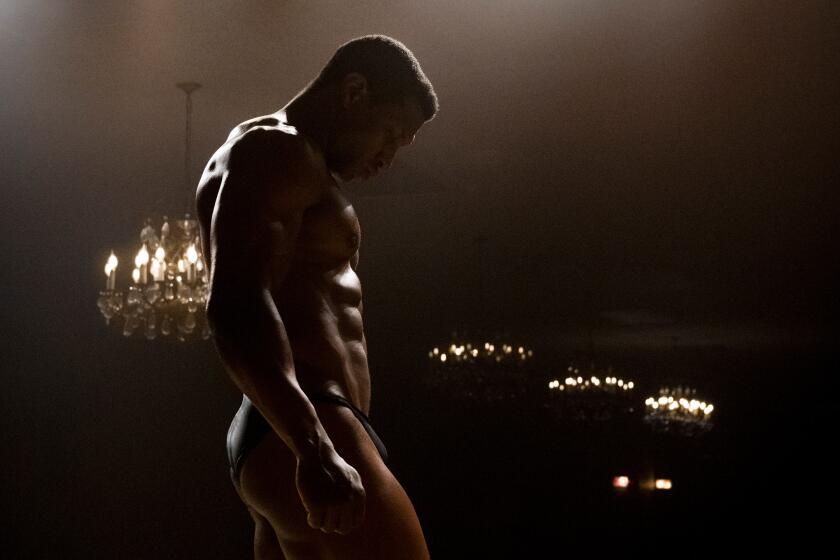Making a Killing in Japan
- Share via
TOKYO — Forty-two ninth-graders abducted to a remote island are forced to play the ultimate game of Survivor: Kill or be killed until only one is left. In gruesome detail, Japanese movie audiences watch as teachers kill students, young girls murder shy admirers, and popular students kill rivals with hatchets and grenades, poison and machine guns.
“Battle Royale,” a film by renowned Japanese director Kinji Fukasaku, portrays a Japan that is falling apart in the early 21st century. Millions are out of work, bureaucrats have lost control, and the government is convinced that its deadly game is the only way to teach rampaging juveniles a lesson.
Japan’s reaction to Fukasaku’s 60th feature film is arguably more interesting than the movie itself, which is characterized by relentless violence and weak character development. The film is setting records at the box office and setting nerves on edge in the Japanese establishment. Fukasaku has fanned a nationwide debate over free speech, government oversight, film ratings and traditional Japanese values.
Until the opening in mid-December of “Battle Royale,” which stars popular actor and television personality Beat Takeshi as a stone-faced teacher, Japan had never restricted a movie because of its violent content, industry officials say. In fact, the R-15 rating given to “Battle Royale” has rarely been used.
The primary focus of Japan’s rating system, which bans underage viewers but does not require theaters to enforce the ban, has been whether films were pornographic or idealized illicit drug use. In those cases, the films were generally rated R-18.
The 70-year-old Fukasaku says he consciously borrowed from the video game format for “Battle Royale.” There is little insight in the movie into why seemingly innocent students would engage in a homicidal melee.
The critics have not been kind. One called the movie--which will be shown at the Egyptian Theater in Hollywood on Thursday as part of a 10-day run of Fukasaku’s films--a “bizarre blend of the soullessly nihilistic and the tiredly retro-sentimental.”
However, the graphic violence and Fukasaku’s choice of subjects--young Japanese rather than the hardened soldiers and gangsters shown in his previous movies--combined with rising concern over juvenile crime, are forcing Japan to reconsider the assumption that violence in the media doesn’t lead to violence in real life.
Guns are rare in Japan, particularly automatic weapons, and the country has not had a school massacre to sear its national psyche. Furthermore, youth crime rates remain well below those of most advanced countries, including the United States.
Largely because those rates have been so low, most Japanese find extremely disconcerting a recent string of high-profile and often ghastly felonies allegedly committed by teenagers. Several of the accused said they had difficulty distinguishing between reality and virtual reality, adding that they were inspired by films, television news and comic books.
In late December, two teenagers were charged with the fatal stabbing of a taxi driver in central Japan. That followed a number of crimes allegedly committed by juveniles: a bus hijacking and fatal stabbing of a woman last May in Hiroshima by a 17-year-old, the killing of a woman by her 17-year-old son in June, the fatal stabbing of three neighbors in their beds in August by a 15-year-old, and the bombing in early December of a video store by a 17-year-old.
“I wanted to destroy humans,” the alleged bomber, who reportedly acted after watching a number of violent videos and TV programs, told police, according to the Yomiuri Shimbun newspaper.
Bullied and Ignored
Police and psychiatrists say many of the juvenile offenders are loners who were bullied by their peers and ignored by their parents--further evidence of a breakdown in Japan’s communal system.
“Children used to play in groups, but now they play video games, often by themselves in their rooms,” said Koki Kirihara, senior superintendent with the national police.
In one of the most dramatic cases, in Kobe in 1997, a 14-year-old boy allegedly progressed from killing birds and cats to killing younger children. All of it went unchecked by adults. Eventually he left the severed head of his last victim, an 11-year-old boy, in front of his school with a letter that read, “This is the beginning of a game.”
Last November, lawmakers lowered to 14 from 16 the minimum age at which suspects can be held criminally responsible. Other people are calling for “morals courses” in schools and tougher control over film and other media content.
In his crowded parliamentary office, opposition legislator Koki Ishii sharply criticized “Battle Royale” and what he sees as the film industry’s tendency to pander to base tastes in its quest for profits. Free expression is important, he said, but at least as important is society’s right to shelter its youth and protect itself against criminals.
“This film is rubbish,” Ishii said. “It turns murder into a game. I see lots of movies, but this is the worst, lowest-level one of any I’ve seen.”
“Battle Royale” also is focusing attention on the country’s rating system, which was established in 1949 and, like its Motion Picture Assn. of America model, is maintained by the industry.
In contrast to its U.S. counterpart, however, the Japanese system is essentially dependent on peer pressure and self-regulation, not the box office, to keep underage moviegoers out.
“Battle Royale” critics say it should have been rated R-18. They’re also calling for a binding system of ratings enforced by the theaters.
“R-15 doesn’t mean anything--anyone can get in,” said Isao Shimizu, president of the Tokyo Public High School PTA. “Furthermore, the rating is only the judgment of five people from the movie industry who are concerned with profits.”
Under pressure from lawmakers and parents, Japan’s Education Ministry called on theaters to stop showing violent films such as “Battle Royale,” a plea that distributor Toei Co. ignored. In the past, analysts say, such “administrative guidance” would have been followed.
Far from exercising restraint, Toei has distributed the film, which cost just $2.9 million to make, for showing on more than 200 screens nationwide, and it now considers the movie a major commercial success. Lawmakers appear to have done the company a huge favor with their criticism.
“Since they started rocking the boat, there’s been enormous publicity and many more people now want to see it,” said Toei publicist Kaoru Sugita.
The Education Ministry is supporting a proposed law that would give central and local bureaucrats authority to restrict not only films but also comic books, magazines and television programming. The major governing and opposition parties have vowed to submit competing bills early this year.
“We need a national law to close the loopholes,” said Yasufumi Sakitani, a director-general at the Ministry of Education. “Without a cooperative, harmonious society and a focus on ethics, the nation could become bankrupt.”
Government control over the media touches a nerve in a country where bureaucrats subjugated almost all creative thought to the single-minded task of winning World War II during the nation’s dark days of militarism.
Critics also say the proposed law is naive and unworkable in the Internet age and amid the global trend toward decentralized creativity.
“If they went ahead and did this, it would be stupid and do real damage to Japan’s economic and social development,” said Tetsuo Kogawa, media professor at Tokyo Keizai University. “Diversity in Japan is very precious because it’s been discouraged for so long and must be nurtured.”
Wary of the ‘Cure’
Even some parents who dislike “Battle Royale” see more danger in the potential cure than the illness. “The industry rating system may be too lenient, but the government should stay out,” said Kumiko Miura, a PTA vice president. “In the end, you have to trust people’s common sense.”
Although the media may bear some responsibility, film industry officials argue, they too often become a scapegoat for broader changes in society.
After a jump in 1997, the number of serious juvenile crimes--including murder, rape and armed robbery--has remained fairly constant in Japan at about 2,200 annually, according to police statistics. And the 1,979 serious crimes posted in the first 11 months of 2000 suggest that the final tally will fall below the 2,237 recorded in 1999.
Furthermore, say family experts, today’s adults aren’t very good role models. They commit twice as many crimes per capita as do juveniles. And once-exemplary Japanese institutions seem to be crumbling amid rising unemployment, dysfunctional companies, higher divorce rates, an increase in broken homes and police and teacher scandals.
“Japanese society in general is going in the wrong direction, even as children become more isolated,” said Shingo Takahashi, a psychiatrist with Toho University Hospital. “As adult society becomes more aggressive, children reflect this as well.”
Other experts see a culture in transition.
“Traditional relationships are getting weaker, leaving society between value systems,” said Tamotsu Sengoku, director of the Japan Youth Research Institute. “The group control is breaking down, but self-control is not yet strongly established.”
Director Not Troubled
Fukasaku said in an interview that he feels no responsibility for any reckless or violent action people may take after seeing his films. Violence in film can be a purifying force, he said, even a metaphor for the growing aggression seen in modern society.
Fukasaku said he drew on his violent youth in making the film. Born in 1930, he grew up during the war and was drafted as a child to work in a munitions factory. There, he said, he learned to avoid naval bombardment by shielding himself under bodies that he later helped bury.
“Much later, when I was in film school and sought inspiration, I realized it was that violence that I could draw on,” he said. “The ‘Battle Royale’ story matched my style and my ideas.”
Several teenagers leaving a recent screening in Tokyo said adult fears that the movie would set off a wave of copycat crimes were absurd.
“I really enjoyed the movie and thought it was interesting,” said Natsuro Kuboki, 16. “But there’s no danger kids are going to go out and try this stuff.”
*
Hisako Ueno in The Times’ Tokyo Bureau contributed to this report.
More to Read
Only good movies
Get the Indie Focus newsletter, Mark Olsen's weekly guide to the world of cinema.
You may occasionally receive promotional content from the Los Angeles Times.










